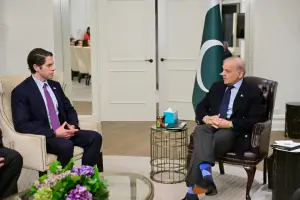No principles followed in suspending military courts decision: Salman Akram Raja
3 min read
Senior Lawyer Salman Akram Raja said on Wednesday that the Supreme Court decision to suspend the ruling on military courts was not done in an appropriate matter and lawyers were not even given enough time to make their arguments.
Speaking in Spotlight on Aaj News, Raja said that maintainability was one thing, but it was not even appropriate to decide the military courts appeal.
He said that the bench as not hearing an appeal against a lower court’s decision which could be summarily set aside. He added that the five judges whose decision had been set aside had the final award on life and death of citizens in Pakistan.
Raja added that the original case had gone on for more than two months but lawyers were not even given more than two minutes to argue the case on Wednesday.
He went on to say that if the people had been in custody for seven months, the court could have afforded to wait another few weeks as the detailed judgement was issued.
Former Attorney General Ashtar Ausaf questioned if it was approprate to settle matters on short orders and find reasons later. He said that detailed orders often include factors that occurred after the original hearing.
He added that the Supreme Court had allowed on multiple times that appeals could be filed on short orders otherwise they would be barred by time.
Colonel Inam ur Raheem said that he had challenged 30 military court trials in the SC out of which 25 were never afforded counsels.
He said that the families of the accused found out through jail that three of them had been sentenced to death while others were sentenced to 10-20 years in prison. He added that no copies of the judgement were offered and only a simple piece of paper with the sentence was handed over.
The lawyer added that when the judge advocate general of the army had been summoned for contempt, the judge hearing the case, Justice Waqar Ahmad Mirza, was transferred.
Raja said that there were no principles followed in the case at all. He added that junior judges had been included in the case and no reasons had been given for recusals.
He said that not hearing a case was not a sweet-willed discretion but needed a strong reason. He said simply refusing to hear cases was an abdication of duty.
The lawyer added that the court had not clearly expressed an opinion when the matter of the previous judgement not being followed was raised.
He added that the constitution not only required the judiciary to be free but also had a separation clause to detach it from everything else.
Raja said that military officers are subordinates of the ministry of defence. He said that they are bound by the military’s discipline and cannot be considered judicial officers.
Ausaf added that until being struck down, section 2(1)(d) was part of the statute book so the trials in military courts could not simply be declared illegal.
He added that even the composition of the original bench that heard the case had questions raised on it. He said that it had been said that the bench should not have been set up until the matter of benches hearing cases under 184(3) was settled.
Raheem replied that he agreed that people accused of attacking military installations should be tried but under the law of the land not in military courts.
He added that even the army act said that soldiers accused of crimes would also be tried in civil courts.
Salman Akram Raja said that while sections of the army act allowing civilian trials had been part of the law of the land, it was in face a ‘black’ law.
He said that the military trials were planned for a quick pace to arap them up within three or four days and that is what would happen now.
For the latest news, follow us on Twitter @Aaj_Urdu. We are also on Facebook, Instagram and YouTube.
























Comments are closed on this story.